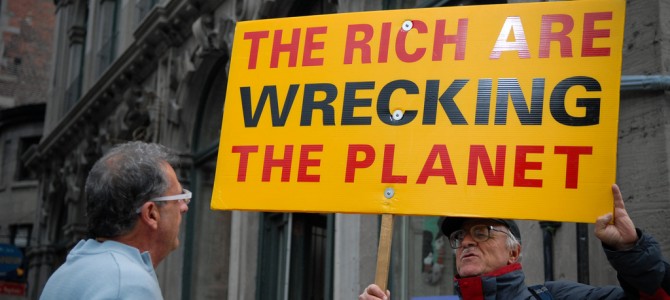
One of the principal catalysts of political action is disaster: for better or worse, few things are more likely to get a bill passed than a tragedy of some stripe. The PATRIOT Act is a creature of the September 11 terrorist attacks, as is the miserable Transportation Security Administration; the numerous mass shootings the country has experienced over the past four or five years have given way to various state-level gun control laws; and even today we still have a great many irritating and odious regulations on the books passed during the New Deal in response to the Great Depression. It’s understandable why politicians respond to calamity in such a fashion: they want to seize the opportunity to secure their own political power and effect the change that such power theoretically affords.
Occasionally, if there’s no crisis to be found, a certain class of political actors will feel the need to make one up. When it comes to manufacturing catastrophes, there is no better practitioner of the art than Big Climate, which for several decades has been lazily issuing a new Extinction Event warning a couple of times a year, breathlessly informing the human race that our own self-inflicted destruction is just a few vapors of greenhouse gas away. Collectively, the die-hard climate change crowd plays the role of the long-bearded, wild-eyed sandwich-board-wearing doomcrier on the street corner, constantly warning us “THE END IS NEAR”—with the notable exception, of course, that nobody demands we take the doomcrier seriously by enacting an economically-devastating set of political policies. Most people just ignore him.
If you want a perfect encapsulation of the neurotic fearmongering that informs virtually all of popular climate science today, look no further than the United Nation’s latest pronouncement on the matter: the UN World Meteorological Organization recently came out with a series of “imagined weather forecasts” predicting the state of climate in the year 2050. “Miami South Beach is underwater,” announced one forecast; another predicted a mega-fatal “mega-drought in Arizona.” Never mind that the average weatherman can barely predict whether or not it’s going to rain tomorrow: instead, think about the fact that the United Nations is so hard-up for climate-change material that they’ve looked 36 years into the future to create fictional accounts of what the weather may be like. The tsunamis, the blistering drought, the Beginning of the End—all this stuff was supposed to be here years ago. The global climate chaos has never materialized, so the “experts” have set their sights on the future, doing some educated guessing on what the weather’s going to be like four decades hence.
Maybe we should just ignore them.
In a sense it’s not difficult to understand where the “climate experts” are coming from when they start moving the goalposts nearly half a century into the future. As Anthony Watts pointed out recently, climate science predicted in 2009 that the world would “warm faster than predicted in [the] next five years,” a process that would doubtlessly “silence global warming sceptics.” Well, the world did not “warm faster”; as a matter of fact, it didn’t warm at all, and the “skeptics” have been anything but “silenced,” if only because we’re able to observe the difference between the climate lobby’s grandiose disaster predictions and the unremarkable reality of the climate itself. Climate science is the only field in which you’re derisively considered a “skeptic” or a “denier” by forming your judgment based upon the facts. The solution is to move the “facts” as far into the future as possible in order to delay the inevitable judgment.
Signs of Desperation
The climate lobby is thus growing desperate, its entire disaster-drenched narrative unraveling before its very eyes. It does not have the catastrophe it desperately needs to sustain itself as a respectable ideological faction, and its death throes are becoming both comical and alarming as it grasps frantically for any shred of relevance. The European Union is considering a ban on high-powered hair dryers “to meet a target for energy savings of 30 per cent across the EU by 2030” (hey, maybe it’ll be enough to avert the South Beach tsunami of 2050). There’s a bitter kind of humor to it all—one of the great threats to global welfare is apparently your hair dryer—but it’s more troubling than anything.
They won’t stop with the hair dryers. They always start small and work their way up from there. The climate-change crowd may be growing ever-more pointless by the day, but their egos are fragile, and they will not slide into irrelevancy without first attempting to take your hair dryers and whatever else they can grab. “We want to curb power consumption,” Germany’s EU energy commissioner claimed. That’s how it starts. For now they’re just curbing “power consumption”; eventually they’ll get around to controlling human procreation in order to “help the planet’s fragile and depleted ecosystems;” at some point they’ll simply control whatever the hell they want in the name of an outdated and unscientific theory.
The average global temperature has been effectively flat for 19 years—not simply rising more slowly than predicted, mind you, but flat. Paused. Nobody predicted this; the climate models failed to even consider it. Climate science should be a subject marked by humility, skepticism, and cautiousness. Instead, it’s a topic overpopulated by blowhards, self-aggrandizing megalomaniacs, and environmentalists more interested in authoritarianism than anything else. We should be entirely skeptical of the ceaseless predictions of climate catastrophe–and we should be completely wary of the senseless alarmists and the little tyrants that peddle them.
Daniel Payne is a senior contributor at The Federalist. He blogs at Trial of the Century. You can follow him on Twitter.









